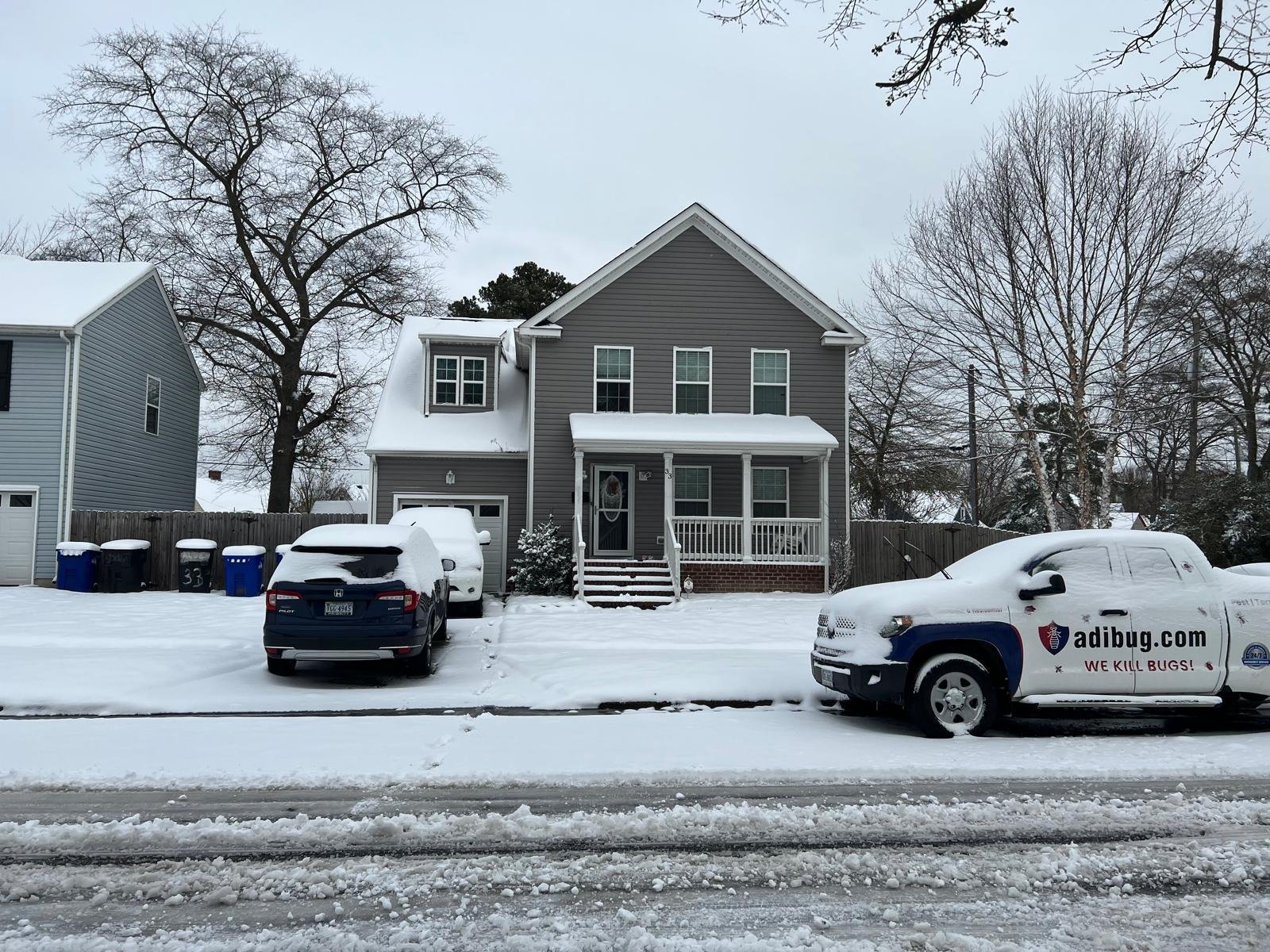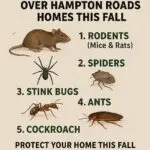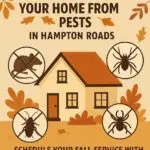
Essential Tips to Prepare Your Home for Winter Pests
As temperatures drop and winter approaches, it’s not just humans who seek shelter indoors—pests do too. Many common household pests, such as rodents, spiders, and cockroaches, are known to invade homes in search of warmth, food, and water during the colder months. Failing to pest-proof your home for the winter can lead to infestations that are not only unpleasant but also costly to control.
To help you prepare your home for the winter season, we’ll provide a guide to pest-proofing your space and protecting it from unwanted invaders.
Why Winter Brings More Pests Indoors
Pests are cold-blooded creatures, meaning their activity slows down as temperatures drop. To survive, they need a warm environment with easy access to food and water, which makes your cozy home an ideal refuge. Winter pests like mice, rats, spiders, and cockroaches are experts at finding entry points into your home, and once inside, they can multiply quickly, causing health risks and structural damage.
Common Winter Pests to Watch For
Before you begin pest-proofing your home, it’s important to know which pests are most likely to invade during the winter months.
1. Rodents (Mice and Rats)
Rodents are among the most common winter pests. They seek shelter in basements, attics, and walls, where they can nest and reproduce.
- Signs of Infestation: Droppings, gnaw marks, scratching sounds in walls or ceilings, and nesting materials like shredded paper or fabric.
- Risks: Rodents can chew through wires, insulation, and wood, causing structural damage and increasing the risk of fire. They also carry diseases such as salmonella and hantavirus.
2. Spiders
While spiders may not be as destructive as rodents, they can still be a nuisance during the winter. They often enter homes through cracks and gaps in search of warmth and prey.
- Signs of Infestation: Webs in corners, basements, and attics.
- Risks: Some spiders, like black widows and brown recluses, are venomous and can pose health risks if bitten.
3. Cockroaches
Cockroaches are resilient pests that can survive in various conditions, including cold weather. They enter homes seeking warmth and food.
- Signs of Infestation: Droppings, an unpleasant musty odor, and shed skins.
- Risks: Cockroaches can spread bacteria and allergens, leading to food contamination and allergic reactions.
4. Ants
Certain species of ants, like carpenter ants, are known to move indoors during winter, where they can cause structural damage by nesting in wood.
- Signs of Infestation: Wood shavings, small piles of dirt near entry points, and trails of ants.
- Risks: Carpenter ants can weaken wooden structures by hollowing them out for nesting.
How to Pest-Proof Your Home for Winter
The key to keeping pests out of your home this winter is prevention. By taking a proactive approach and sealing off potential entry points, you can significantly reduce the likelihood of a pest invasion. Here’s a step-by-step guide to pest-proofing your home for winter:
1. Seal Cracks and Gaps
Pests can squeeze through even the tiniest cracks and openings in your home’s foundation, walls, windows, and doors. Inspect your home’s exterior for any gaps and seal them using caulk, weather stripping, or steel wool.
- Check Doors and Windows: Install door sweeps and ensure windows are tightly sealed. Use weather stripping around doors and windows to close off any gaps.
- Inspect the Foundation: Cracks in the foundation and exterior walls are prime entry points for pests. Use concrete or steel mesh to seal larger gaps.
2. Keep Your Home Clean and Decluttered
Pests are attracted to cluttered spaces where they can hide and nest, as well as to food and water sources. Maintaining a clean, clutter-free home will make it less appealing to pests.
- Clean the Kitchen: Wipe down counters, store food in airtight containers, and take out the trash regularly. Pay special attention to crumbs and food spills that can attract pests.
- Declutter Storage Areas: Basements, attics, and garages are common hiding spots for pests. Remove clutter and store items in plastic bins instead of cardboard boxes, which can be chewed through by rodents.
3. Store Firewood Away from the House
Firewood can attract pests like ants, spiders, and rodents, especially if it’s stacked directly against your home. Store firewood at least 20 feet away from your house and elevate it off the ground.
- Avoid Storing Wood Indoors: Only bring in enough firewood for immediate use, and avoid storing it inside your home for extended periods.
4. Repair Leaks and Eliminate Moisture
Pests are attracted to moisture, so it’s important to fix any leaks in your home. Inspect pipes, faucets, and drains for leaks and repair them promptly.
- Use a Dehumidifier: In damp areas like basements, use a dehumidifier to reduce moisture levels and make the space less inviting to pests.
- Clear Gutters and Drains: Clogged gutters can lead to water buildup, which attracts pests. Keep gutters and drains clear of debris to prevent standing water.
5. Inspect and Maintain Your Roof
Pests like rodents and squirrels can enter your home through damaged roof shingles or vents. Inspect your roof for loose or missing shingles, and repair any damage to prevent entry.
- Check Chimneys and Vents: Install chimney caps and mesh covers over vents to block pests from entering while still allowing ventilation.
6. Trim Trees and Shrubs
Overhanging branches and shrubs near your home provide pests with easy access to your roof and windows. Trim trees and bushes so they are at least several feet away from your home’s exterior.
- Clear Mulch and Vegetation: Keep mulch and vegetation at least 6 inches away from the foundation of your home to reduce hiding spots for pests.
7. Schedule Regular Pest Inspections
While DIY pest-proofing measures are important, nothing beats the expertise of a professional pest control service. Regular pest inspections can help detect early signs of infestation and ensure that your home remains pest-free throughout the winter.
How Adibug Can Help You Stay Pest-Free This Winter
At Adibug, we offer comprehensive pest control services in Portsmouth, VA, and surrounding areas to help you protect your home from winter pests. Our team of experienced professionals can identify potential entry points, eliminate existing infestations, and provide ongoing preventative measures to keep your home safe all year long.
- Winter Pest Inspections: Our thorough inspections help us detect even the smallest signs of pests, ensuring they’re eliminated before they become a bigger problem.
- Eco-Friendly Treatments: We use family- and pet-safe products to treat infestations, ensuring your home remains safe for everyone while keeping pests at bay.
- Customized Pest Control Plans: Every home is different, which is why we tailor our pest control solutions to fit your specific needs. Whether it’s rodents, ants, or spiders, we’ve got you covered.
Don’t Wait Until It’s Too Late
Winter pests can quickly turn your home into an uncomfortable and unsafe environment. By taking preventive measures now and scheduling a pest control inspection with Adibug, you can enjoy a pest-free winter without the worry of infestations.
Call us today at 7578520085 or visit Adibug.com to schedule your winter pest-proofing service and keep your home safe, warm, and pest-free all season long!







